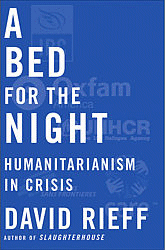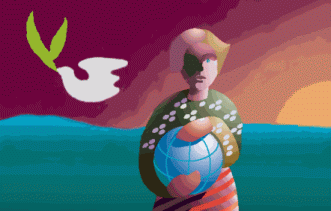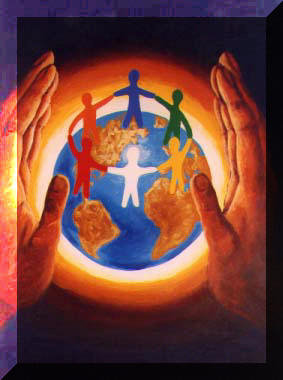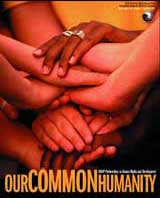|
 VigilanceVoice
VigilanceVoice

VigilanceVoice.com
Tuesday--October 22, 2002—Ground
Zero Plus 405
___________________________________________________________
Is Humanitarianism Dead?
___________________________________________________________
by
Cliff McKenzie
Editor, New York City Combat Correspondent News
GROUND ZERO, New York
City, October 22 -- I awoke this morning to some troubling news.
It seems the world has gone pessimistic.
 |
I popped open the recent
issue of Time Magazine, Oct 21 issue, and turned to an article
called Kindness Kills. It was all about how and why
humanitarianism is counterproductive. In the book review
section, author David Rieff 's ten-year study of the dark side of human
beings, A Bed For The Night:
Humanitarianism in Crisis, was reviewed.
The book describes how ugly human
beings have become, and the hopeless nature of those who try to help them.
Rieff spent the past decade observing killers and humanitarianism
working side by side. His conclusion: "Mankind is
slowly, but in a very determined way, going back to barbarism."
The sources of his conclusion
include Bosnia, Sudan, the Democratic Republic of Congo, Rwanda,
Afghanistan and Angola. Humanitarian forces, he says, are
Band-Aids rather than healing solutions to the world's Terroristic thirst.
He cited the futility of humanitarian groups such as Doctors Without Borders, Oxfam, and the United Nations High
Commissioner for Refugees. In a nutshell, he says humanitarian
workers serve as fig leaves, moral cover for big powers that don't want to
get involved.
To indemnify the ills of the
world, Rieff notes, "there are 27 major armed conflicts taking place in
the world; 1.2 billion people are living on less than one dollar a day;
2.4 billion people have no access to basic sanitation; and 854 million
adults, 543 of them women, are illiterate."
 |
|
Humanitarianism |
Rieff quotes
United Nations first special envoy to the Balkans as saying "You don't
reply to fascism with relief supplies, and you don't counter ethnic
cleansing with reception centers for the displaced." He also
quotes an aide worker as saying about humanitarianism: "far from
representing a bulwark against evil, {humanitarianism may become} in fact one of its
appendages."
Time's book reviewer,
Lance Morrow, capped his review by concluding in his final paragraph:
"Humanitarianism would not have abolished slavery in the U.S. or shut down
Hitler's gas chambers. Sometimes what decency needs is neither
optimism or pessimism but realism, a big stick and the will to use it."
I looked up the word in
question just to
make sure I had the right view of it.
hu·man·i·tar·i·an·ism Pronunciation
Key (hy -m -m n n  -târ -târ  - - -n -n z z  m) m)
n.
- Concern for human welfare, especially as manifested through
philanthropy.
- The belief that the sole moral obligation of humankind is
the improvement of human welfare.
- Theology. The doctrine holding that Jesus was
human only and not divine.
|
|
I took issue with
the idea that people attempting to help others was a retreat to barbarism.
A hundred or more years ago, the plight of people in Rwanda or the Congo
would not be living room news. The idea that humanitarianism
is a Band Aid, a moral shelter to wash one's hands of the blood of
Terrorism, also bothered me.
What I find ironic in such a book is
that the present bloodletting throughout the world is minor in comparison
to history's overall barbarism. Long before there were news
reporters sending live feed signals of tragic world events daily, people
died in squalor without notice. There was no forum for bringing the
horror of life to the world's living rooms, and few cared what
happened to a child starving in another far-off land. Ignorance was
truly bliss.
 |
Realistically,
we have experienced only one generation of "live feed television."
These feed brought the horrors of the world to light. I was at
the dawn of that Terrorism Era.
During the
Vietnam War, the American public and the world got a taste of "live action
Terrorism" by watching brutal battles and the sadness of war as
its spectators ate dinner. Since then, television lenses have shoved their
snouts into the viscera of human ugliness, painting a picture the world
had never seen before, highlighting in vivid living color man's inhumanity to
one another.
But the presence of
horror and Terror in news media headlines doesn't necessarily mean that humankind is regressing
back to barbarism. Everything needs a benchmark, a comparison
point from which the present and past can be viewed. If we are
regressing, then we must say, "compared to what? To when? To
whom?" Otherwise, such a statement is a mere opinion, not a
fact.
Realistically, a
hundred or two-hundred years ago there might have been more than 27 armed
conflicts raging around the world--only we didn't know about them, or
track them, or position them as evidence of human de-evolution on
television or upon the headlines of newspapers..
In 1700, for example, there
were only 600 million people worldwide. By 1800, the number grew to
813 million. In 1900 the population blossomed to 1.5 billion.
And, by the year 2000 there citizens of the earth exploded to over 6
billion.
If humanitarianism is "dead" or
"dying" or "regressing back to primal times," then what accounts for the
spike in population? Could it be that the world has made giant
strides in protecting human life through advanced science and medicine?
Could it be that countries who once ignored the plight of the weaker,
backward nations have extended knowledge and expertise to assist those
nations in improving their lots?
I gravitate toward the second
definition of humanitarianism: The belief
that the sole moral obligation of humankind is the improvement of human
welfare.
I wonder what percentage of
people did not have access to basic sanitation two hundred years ago, or
what percentage was illiterate, or how many lived on far less than
a dollar a day? Or, what the average birth and death rates were?
Along the way, human beings have extended life, and made the world a far
more comfortable place to exist, and offered more hope than dismay that
one day peace and prosperity might rule over Terrorism.
I think author Rieff might have been
chewing nails when he wrote his book, forgetting that the evolution of
human beings is measured in the minds of children, not the actions of
adults.

|
Children today
worldwide are globalizing their concerns for other children.
They have been for years. Their awareness of the plight of
underdeveloped nations forms a bridge between the privileged and
underprivileged that has never existed before in history. If
that's slipping back to barbarism, I must be looking at history with
fogged glasses.
 |
In just one generation, the world has been shrunk
into one
giant television screen. Children can see the children of
other countries ravaged by famine and other pestilences, and become inspired
to act to help bring comfort to their allies, their comrades in youth as
never before in history.
Such "humanitarian" bridges are being
constructed in greater or lesser degrees.. The
most recent was President Bush's call for the children of America to send $1 to
help the children of Afghanistan. While the request might have been
rimmed with political motives, the idea was children helping children for
the children's sake The innocent sided with the innocent.
The belief that
the sole moral obligation of humankind is the improvement of human
welfare.
This definition of humanitarianism has a
ring to it. In the evolution of human beings, there has been a
concern for the elimination of war, hunger and violence since the dawn of
time. It is
not idealism that drives humanitarian efforts, but instead the reality
that human life has incredible social, economic and spiritual values.
When a life is lost and someone sues another in tort law, the value of a
person's life is reduced to economics. While crass to some, it
is a benchmark of economic humanitarianism. It shows that human life has purpose
and value to others, and to take that life subtracts from the prosperity
of the world.
 |
This isn't
barbarism. This is the science of human value.
Humanity means respecting life,
inhumanity means disrespecting it.
I find it hard to fathom that the
world could grow from 1.5 billion people in 1900 to over 6 billion
without some increase in humanity. Respect for human life has
expanded from the direct family and villagers, to the entire world.
Never before in history have the atrocities of a few been broadcast to so
many.
America's stand against Iraq is one
example. While it may be laced with a variety of other
factors--political, social, economic--its fundamental roots wrap around
the rock of humanity. Freeing people from oppression, from
tyranny is a humanitarian effort, one often that costs the blood and lives
of those who assume the "sole moral obligation...to improve human
welfare."
I believe the Pledge of Vigilance is
another example of humanitarianism. Its purpose is to drive
Terrorism out of the minds of children, and their children's children's
children by teaching a child to combat the "barbarism" that still lingers
in human genes. Such Terrorism is agitated to the surface by abuse,
neglect, violence and selfish disregard for the child's emotional and
physical welfare.
 |
The Pledge of Vigilance is
a reminder to parents and loved ones to contain the "Beast of Terror," the
one that Rieff claims is on the march. I agree with that.
Only I don't agree that humankind is slipping back into the Caves of
Terror. Quite the contrary.
Terrorism in all its forms has
brought the awareness of Vigilance to the surface. The
physical manifestation of snipers shooting people, or suicide bombers
killing innocent people, or a bin Laden or Saddam Hussein plotting and
preparing to unleash havoc on a world, serves to focus the world's
attention on the need for optimism rather than pessimism.
It is a prime motivator for the acceleration of human evolution.
It is easy to agree with Rieff that
the world appears to be going backwards when in fact it is going forwards. Such
thinking is intoxicated with Complacency.
But, when all we see or hear is the bile of human nature being promoted, we retreat to pessimism and feel the world is falling apart. On
the other hand, when we look at the willingness of the world to stop
"threats of aggression," and to preemptively attack or sanction those who
threaten the security of the world, we force a stand-off to see whether
optimism or pessimism rules.
That's why I believe also we are entering the Era of
Vigilance rather than the Era of Barbarism as suggested by Reiff.
One could easily mark September 11, 2001, as the date of its inception.

|
To suggest that humanitarianism
is a Band Aid, or perhaps an appendage of Terrorism because
it is a way to placate duty and moral responsibility isn't a
fair or honest appraisal of human nature. It demeans
human beings, and neglects that our world is seeking stability
and peace for all--evidenced by its children's concerns for
all other children--a new high moral ground that has never existed
before.
I understand the pessimism.
As a combat veteran of the Vietnam war, I witnessed incredible
horrors. Such horrors taint one's thinking, as I
believe it did Reiff's. He perhaps saw far too much
blood shed.
I also believe there is
a middle ground between optimism and pessimism.
Lance Morrow said it in his concluding paragraph during his
reivew: "Sometimes what decency needs is neither
optimism or pessimism but realism, a big stick and will to use
it."
If Terrorism is Pessimism,
and Optimism is Complacency to deal with it, then I believe
Vigilance is the Reality that balances the two. The Pledge
of Vigilance, Principles of Vigilance, and the Shield
of Vigilance represent such balance, for it requires one to
not fall victim to Pessimism, and provides tools to keep a watchful
eye against its intrusion.
When one has the
tools to conquer Fear with Courage, and defeat Intimidation
with Conviction, and replace Complacency with Right Actions--we
have the "big stick" Morrow suggests we need.
And, if we
believe in the Pledge of Vigilance, and the protection of the
children's children's children, we have the "will"
to use it.
Pick up the
Vigilant Stick--take a swing at Terrorism by making the Pledge
of Vigilance your way of being a humanitarian.

Oct 21--Terrorists
Face-Off With Vigilance
©2001
- 2004, VigilanceVoice.com, All rights reserved - a
((HYYPE))
design
|
|











